You are no doubt familiar with the phrase, ‘active listening.’ If you want to build trust, strengthen relationships, and resolve differences with your colleagues this is a tool you need in your kit bag. It may sound like a simple concept, but it takes discipline and a honed curiosity to get the best outcomes.
Recently Judy and I attended a conference in Queensland where we had the opportunity to work with other coaches to fine tune our coaching skills. This experience reinforced to us just how powerful and different active listening is from everyday listening. The intention with active listening is to reflect what you have heard and learned in a conversation, whereas in a broader listening environment the intention is usually to respond with your point of view or through your lens.
Active listening is not about you. It’s about the other person. As we practiced active listening in a range of activities we experienced the profound difference this nuance can make. It is motivating to experience someone truly listening to you with the intent of letting you know you have been understood.
In our Confident Conversations workshops, we always talk about the value of having a curious mindset when trying to resolve difficulties in a work environment. Curiosity is the key to active listening. If someone has made a mistake or there’s an awkward situation that needs to be addressed, try finding out what’s going on for this person rather than jumping into problem solving mode. By asking powerful questions about what is driving their behaviour you can better understand their perspective. Instead of making assumptions about the person or situation, which can drift into unhelpful judgements, try being open-minded and use active listening to truly understand the situation.
Reflecting on what you have heard builds trust. It’s a deposit in the emotional bank account you have with someone, shows that you value them and their unique perspective. It creates a sense of safety. The happy by-product is that active listening almost always results in greater self-awareness in the other person which may also help them resolve the situation.
Practise makes perfect
Active listening is a conscious choice. While some people are naturally better at it than others, it tends not to be our default listening approach. It takes practise. I made a conscious effort to be a better active listener with a friend on the weekend.
My partner and I attended a theatre production in Gosford on Saturday as a friend of ours was performing. After the show, we stayed on to congratulate him and have a chat with the cast. We ended up giving him a ride back to Sydney which provided me with the ideal opportunity to learn more about his life in the theatre. I am an avid fan of the arts but wanted to learn more about what it’s like to be a performer on stage and behind the scenes. So by applying my active listening skills, I learned so much more about his feelings and experience of being on stage. Rather than interrupting with my opinions, I asked lots of questions and listened. I found out all sorts of interesting details about how he manages things such as nerves and the logistics of multiple costume changes. It was an enriching conversation that gave me a deeper understanding and I believe created a stronger connection.
We have spoken before about why listening is a superpower. Active listening is a hyperpower! It can be so easy to talk about our own experiences in conversations, but active listening is a gift. It is also rewarding for the listener. We urge you to try it.

